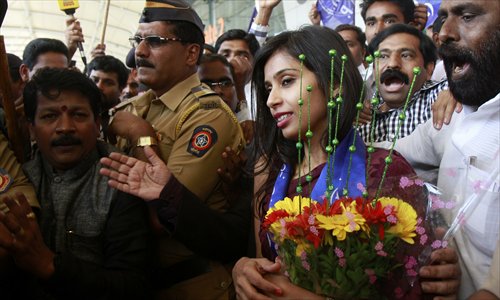Stalemate between US and India

Devyani Khobragade, the Indian deputy consul general in New York who was indicted by a US federal grand jury for visa fraud of her housekeeper, returns to Mumbai, India on January 14, 2014. Photo: CFP
Relations between the world's two largest democracies have been at a stalemate for some time. Kanwal Sibal, former chief of the Indian Foreign Service, feels the need for change.
In an article published in English-language daily Mail Today, he says, "After having entered into a green light mode, India-US relations have slipped into an amber mode."
In other words, they are ready to go ahead but are not moving.
US Ambassador Nancy Powell has decided to return without completing her term and there is widespread belief that her resignation is linked to the current diplomatic stalemate between the US and India. In any case, her continuation had become problematic as bilateral relations between the two countries became strained during her tenure on account of the role played by the US Embassy in New Delhi and State Department in Washington in the diplomatic row over the Khobragade episode.
However, less than a year ago, India's External Affairs Ministry in its annual report had confidently declared that "India-US bilateral relations have developed into a global strategic partnership, based on increasing convergence of interests on bilateral, regional and global issues."
So what went wrong? Isn't it a fact that Indians by and large love the US?
Nonalignment in 'India's DNA'
They do, says Mohan Guruswamy, distinguished fellow at Forum for Strategic Initiatives, New Delhi. "Indians admire the US like the Chinese are enamored by it. The US is the choice destination for educated Indians as it is seen as a society that rewards merit and achievement," he said. However, he points out that it is largely "an unrequited love."
Guruswamy says that while the US is quite "insular," they often view better off Asians as a "threat to their dominant position." In his view, their prejudices are reflected in their government's attitude towards China and India. "Their interest in India is to have a countervailing power in Asia lined up with them against China. After expending a lot of energy on wooing India as an ally, they have only now realized that India is not about to become anybody's ally or enemy to suit the needs of a third country. Strategic autonomy and nonalignment are part of India's DNA," Guruswamy told the Global Times.
The US State Department continues to adopt an ambivalent attitude towards India despite the formal forging of a strategic partnership. Human rights and intellectual property rights are often used against India by various US lobby groups.
Shreya Upadhyay, a research fellow at the Institute of Conflict and Peace Studies, New Delhi, finds that quite a few things have gone wrong in relations between India and the US. Speaking to the Global Times, she points out that issues related to the pharmaceutical industry, telecom, aviation, visa rules, foreign direct investment, nuclear liability, and the US refusal to share intelligence data and grant access to India to investigate David Hadley are real irritants. The way Indian diplomat Devyani Khobragade was arrested and strip-searched in the US added fuel to the fire, leading the Indian government to withdraw all special facilities and privileges to US diplomats in India and treating them on a strictly reciprocal basis.
Avinash C. Chaubey, CEO of Business Resources and Solutions, opines that the US behaves with countries such as India "like a bully" and does not like it if they stand up to them. The US needs the vast market that India offers but it also wants India to compete with China. Chaubey feels that China is not interested in any overt confrontation with India as it also eyes its market. Therefore, the US feels frustrated.
Kanwal Sibal takes a dim view of the way US corporations exert pressure on their government.
Mutual benefit
However, there is no denying the fact that both India and the US need each other. Despite glitches on the diplomatic front, it would not be prudent to conclude that the strategic partnership between the two is so fragile that one incident or situation can affect it. As the process of American withdrawal from Afghanistan makes headway, India's security concerns will increase and a close security relationship with the US will be in its national interest. "New Delhi and Washington will not miss the broader picture because of the bilateral difference. Both will try to resolve them soon," says Shreya Upadhyay.
However, the fact remains that India is going to get a new government next month. President Barack Obama's interest in India has been on the wane and he is bogged down with domestic issues and Afghanistan. Still, leading Congressmen are waiting with expectation for the new government to take over in New Delhi
Democratic Senator and member of India Caucus Tim Kaine in a statement recalled that President Obama had described the India-US relationship as the leading partnership of the 21st century. He also underlined the fact that bilateral trade had reached $100 billion, Indian companies had invested $ 17 billion in the US, 100,000 Indian students study in the US, and a 3-million-strong Indian-American community underpinned the relationship. "This is a relationship that enjoys broad bipartisan support on Capitol Hill," Kaine said, pointing out the potential and promises of bilateral cooperation.
In India, there is a broad political consensus to maintain good relations with the world's most advanced country. India has a large population of young people who aspire to move ahead in life. For them, the US remains the land of opportunity. However, only time will tell if the US seizes upon the opportunity to rebuild its ties with India.